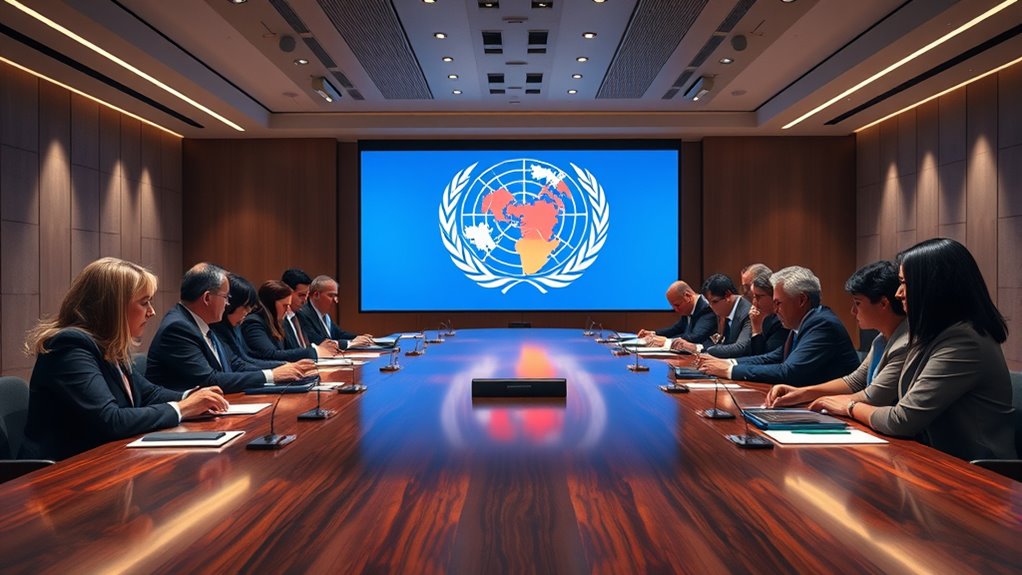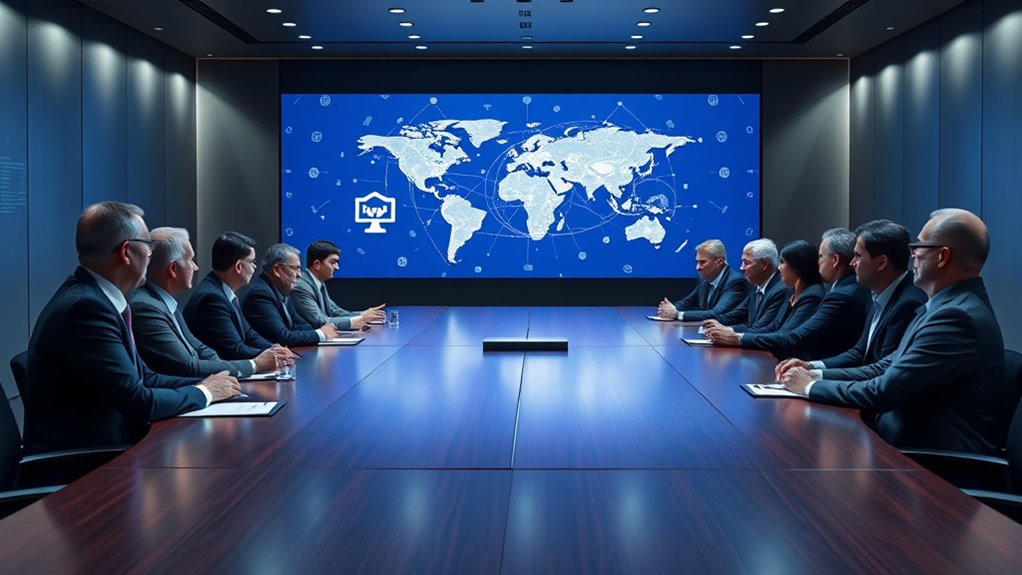Creating a global AI accord based on UN norms and treaties is challenging but not impossible. While international cooperation can foster dialogue, transparency, and responsible development, divergent national interests, rapid tech progress, and enforcement hurdles pose significant barriers. Building shared norms requires trust, compromise, and strong commitments. If you want to understand how these efforts might succeed and the obstacles involved, exploring the complexities of global AI regulation can shed more light.
Key Takeaways
- Developing a global AI accord faces challenges due to rapid technology evolution and diverging national priorities.
- UN norms can foster dialogue and set shared ethical standards, but binding treaties require consensus and are slower to implement.
- International enforcement is difficult because of differing legal systems and varying commitments among countries.
- Soft law guidelines can promote responsible AI, but enforceable agreements are necessary for effective regulation.
- Despite obstacles, establishing a global AI accord is possible through trust, cooperation, and shared commitment to safety and ethics.

Have you ever wondered how the United Nations shapes international behavior? It’s through a complex web of norms, treaties, and agreements that set expectations for countries worldwide. These instruments function as the backbone of global cooperation, guiding states to act responsibly, especially on pressing issues like peace, security, and human rights. But when it comes to emerging challenges like artificial intelligence, the question arises: can these tools effectively regulate a technology that evolves so rapidly? The idea of a global AI accord sounds promising, but it faces significant hurdles rooted in the very nature of international law and diplomacy.
UN norms are generally non-binding principles that reflect shared values among nations. They serve as a moral compass, encouraging states to align their actions with common standards. Treaties, on the other hand, are legally binding agreements that specify obligations countries commit to uphold. While treaties carry more weight, they require consensus and ratification by participating countries, which can slow down the process. When it comes to AI, the rapid development and deployment make it difficult for international institutions to keep pace. Countries often prioritize national interests and economic benefits over collective regulation, making binding agreements challenging.
UN norms guide shared values; treaties bind but are slow, challenging rapid AI regulation globally.
Efforts to create a global AI framework have gained momentum, but reaching a consensus is complex. Different nations have varying priorities—some emphasize innovation and economic growth, while others focus on safety and ethical considerations. This divergence complicates the drafting of universally acceptable norms or treaties. Additionally, enforcement remains a concern. Even if a treaty is signed, ensuring compliance across diverse legal systems and political contexts can be difficult. Countries might interpret rules differently or choose to ignore them if they perceive benefits outweigh risks.
Despite these challenges, the pursuit of a global AI accord isn’t without hope. International organizations like the UN can facilitate dialogue, foster transparency, and promote best practices. They can serve as platforms for negotiations, helping to build trust and consensus. Soft law instruments—non-binding guidelines and recommendations—can also play a crucial role in shaping responsible AI development while binding treaties are being negotiated. Furthermore, understanding the importance of projector technology in visual communication underscores the need for standardized international frameworks in rapidly advancing fields. Ultimately, establishing a robust, enforceable global AI treaty demands unprecedented cooperation, trust, and a shared vision for the future. While difficult, it’s not impossible, and the stakes couldn’t be higher, considering AI’s potential to transform societies worldwide. Building these norms now can help ensure that AI benefits humanity rather than exacerbating risks or inequalities.
Frequently Asked Questions
How Would Enforcement of a Global AI Accord Be Managed?
You would see enforcement managed through international cooperation, with countries establishing clear compliance mechanisms and regular reporting requirements. You might also implement independent bodies to monitor adherence and impose penalties for violations. Additionally, fostering transparency and accountability becomes vital, encouraging nations to share data and best practices. By creating a trusted framework, you help guarantee everyone follows the accord, reducing risks and promoting responsible AI development worldwide.
What Challenges Exist in Achieving Consensus Among Nations?
Imagine you’re trying to get everyone on a spaceship to agree on the same course, but each has their own destination in mind. Achieving consensus among nations is tough because of differing priorities, economic interests, and cultural values. You’ll face mistrust, geopolitical tensions, and fears of losing sovereignty. Convincing all to cooperate requires overcoming these hurdles, much like uniting a diverse crew with conflicting visions for their shared journey.
Could a Global AI Treaty Hinder Technological Innovation?
A global AI treaty could potentially hinder technological innovation if it imposes strict regulations that limit research or deployment. You might find that overregulation stifles creativity and slows progress, especially if compliance becomes too burdensome. However, with balanced rules, innovation can still thrive while ensuring safety and ethics. Ultimately, careful design of the treaty is vital to avoid hampering the development of beneficial AI technologies.
How Are Privacy Concerns Addressed in International AI Agreements?
Privacy concerns are the guardrails in the highway of international AI agreements. You’re expected to implement strict data protection standards, ensuring transparency about data use, and promote accountability for breaches. These agreements encourage sharing best practices, fostering mutual trust and safeguarding individual rights. By establishing clear, enforceable guidelines, you help prevent misuse of personal information, making the AI landscape safer and more respectful of everyone’s privacy.
What Role Do Private Companies Play in Global AI Regulation?
Private companies play a vital role in global AI regulation by setting industry standards, developing ethical guidelines, and promoting responsible innovation. You can influence this process by adopting best practices, participating in international collaborations, and advocating for transparency. Their expertise and resources help shape policies that balance innovation with safety. By engaging proactively, you guarantee AI development aligns with societal values and global norms, fostering trust and accountability worldwide.
Conclusion
While the idea of a global AI accord seems formidable, don’t throw in the towel just yet. It’s clear that international norms and treaties can serve as a starting point, but they’ll require collective effort and flexibility to truly work. Remember, Rome wasn’t built in a day, and neither will a perfect AI agreement. If we stay committed and adaptable, we might just turn the tide in shaping a safer, more responsible AI future for everyone.








